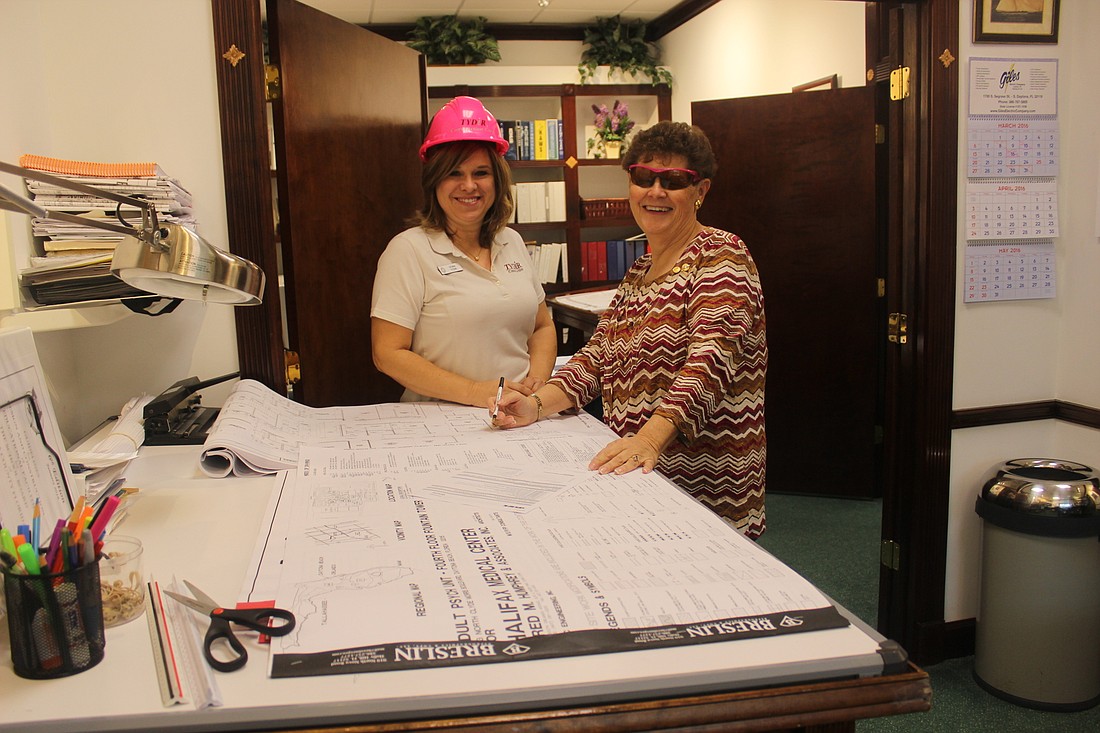- February 21, 2025

On the second shelf of Ivona Tydir's bookcase sits the typical gear you'd need to visit a construction site: boots, a hard hat and protective eyewear. However, something about her gear isn't so typical — it's all pink.
Though construction companies tend to have the reputation of being a boys' club, Tydir, president of Tydir Construction, and Bobbie Cheh, office manager at Peck & Associates Construction Inc., refuse to make it feel like one.
"I was a job site secretary for seven years," Cheh said. "You sort of have to prove yourself when you're out there. They don't take you as seriously as a man. My safety officer would come out and tell the guys one thing, and when he went back inside, they would go back to doing it. I would tell them to stop, and they would say 'Well who are you to tell us what to do?' But it's getting better I think. Women are being more accepted in the industry, at least that's the way I feel."
Cheh originally worked in the medical field, and moved down to Ormond Beach in 1975. When she went to the unemployment agency, they sent her to a construction company. Though she's not sure how they came up with that decision, she's thankful for the random placement.
"I have a career, not a nine to five job," she said. "If you have to work through your lunch hour or stay until nine to get a job done, then you do it. Whatever it takes."
Tydir's path to construction was a little more complicated. Born in Czechoslovakia, she met her husband, Peter Tydir, by accident.
"He dialed the wrong number," Tydir laughed. "He was living here in Daytona, going to school and called information and they gave him our phone number by mistake. He was trying to call someone else with our same last name who lived in the same apartment building. When he called, I knew right away that he was calling them. But he called back."
They talked on the phone for a couple years, and when he got his mechanical license, they met in Prague and Tydir moved to America. She was 21 when she started working with her husband, and in 2003 she started her own company.
"I started just helping him with some paper work," she chuckled, "and I'm still doing it."
Both women are celebrating Women in Construction Week, an event observed by The National Association of Women in Construction from March 6 to 12. The focus of the event is to highlight women as a visible component of the construction industry. For Cheh, her personal highlight is seeing her work all around town.
"It's exciting to see something built from the ground up," she said. "I love to go past a building when people come into to town, say 'Oh, see that building? I helped build that one.'"
"I did a project for the Navy a few years ago," said Tydir. "Coming from a Communist country and working for the Department of Defense, as small of a project as it was, it's something I'm proud of. My husband has done projects at NASA, but never worked directly for the Department of Defense, but I did. Beat him in that one."
Both Tydir and Cheh have major concerns when it comes to the future of the entire manpower industry. With the country focused on an academic-driven education, the women wonder who exactly will be doing the hard work required to maintain and grow our cities.
"Everyone will have a college degree, and nobody will know how to fix a toilet," Tydir said. "Not everyone can be an executive."
"There's good money to be made in the trades," said Cheh. "But people consider it a dirty job. There's gonna be a shortage in man power. It's hard work, but someone needs to learn how to do it."
Though the ladies try to gather interest in the job from students by visiting during career days, they think there's a more effective solution to the problem: more vocational schools. Tydir said that when she was living in Czechoslovakia, only about 8% of students went on to a traditional high school like Seabreeze High School, and the rest went on to a vocational school.
"If someone wanted to learn block masonry or working with concrete," said Cheh, "where would they go?"
"You have to take a risk," said Tydir. "It takes time, energy and investment, but you have to do it."
In Flagler and Volusia County, the number of jobs supported by labor-intensive industries such as construction is small relative to other industries. According to an April 2015 report from Career Source Flagler Volusia, there were 10,300 mining, logging and construction jobs in Flagler and Volusia County one month earlier, compared with 37,700 jobs in education and health care, and 29,100 jobs in leisure and hospitality services.